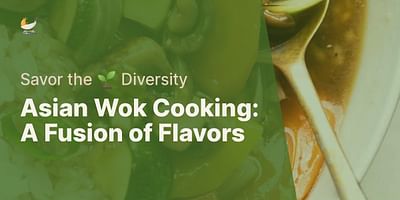Katlyn Considine is a passionate food enthusiast and skilled home cook who developed a deep admiration for wok cooking during her extensive travels throughout Asia. She delights in experimenting with a variety of ingredients and culinary techniques, and takes great pleasure in imparting her knowledge and exciting discoveries to her devoted readers.
One of the first questions I often get asked when I share my love for wok cooking is, "Why is it important to season a wok?" Believe it or not, seasoning a wok is crucial not just for the longevity of your wok, but also for the taste and quality of your dishes. Let's dive in!
Unraveling the Science Behind Wok Seasoning 🧪
Seasoning a wok might sound complex, but it's actually a simple process that involves coating your wok with a thin layer of oil and heating it to a high temperature. This process is known scientifically as "polymerization". The heat transforms the oil into a hard, protective layer that adheres to the metal surface of the wok. This layer serves two main purposes: it creates a non-stick cooking surface and it helps to improve the flavor of your dishes.
Why Seasoning Your Wok Matters 🍳
Now that we understand the science behind seasoning, let's explore why it's so important.
1. Non-stick Surface: The seasoning process creates a natural non-stick surface, making it easier to cook and clean your wok. This is especially beneficial when cooking dishes that are prone to sticking, such as eggs or certain types of fish.
2. Enhanced Flavor: A well-seasoned wok is often described as having a "wok hei", a Cantonese phrase meaning the "breath of the wok". This refers to the unique, smoky flavor that food cooked in a seasoned wok takes on. The more you cook with your seasoned wok, the better your food will taste!
3. Longevity: Seasoning protects your wok from rust and damage. It acts as a barrier between the metal and any moisture, which can cause rust. Regularly seasoning your wok can extend its lifespan and keep it in good condition for years to come.
Let's take a look at how to properly season a wok with this informative video:
Now that you've seen how to season a wok, let's move on to a step-by-step guide on how to do it yourself.
Your Step-by-Step Guide to Wok Seasoning 👩🍳
Seasoning a wok is a simple but crucial process. Here's a step-by-step guide:
1. Clean: Start by cleaning your new wok. This removes any factory oils or residues. Use warm soapy water and a soft sponge.
2. Heat: Dry your wok and heat it over medium-high heat. You'll know it's ready when a drop of water evaporates within seconds of contact.
3. Oil: Add a thin layer of high-smoke point oil (like peanut or canola oil) to the wok.
4. Season: Spread the oil around the wok and heat until it starts to smoke. Then, let it cool and wipe out the excess oil. Repeat this process a few times to build up a good layer of seasoning.
And that's it! You've seasoned your wok. With regular cooking and proper wok care, your wok will develop a beautiful, dark patina over time and your dishes will taste better than ever.
The Art of Seasoning a Wok
Test your knowledge on the importance of seasoning a wok and how to do it.
Learn more about 🥢 The Art of Seasoning a Wok: Test Your Knowledge 🥢 or discover other Hip Wok quizzes.















